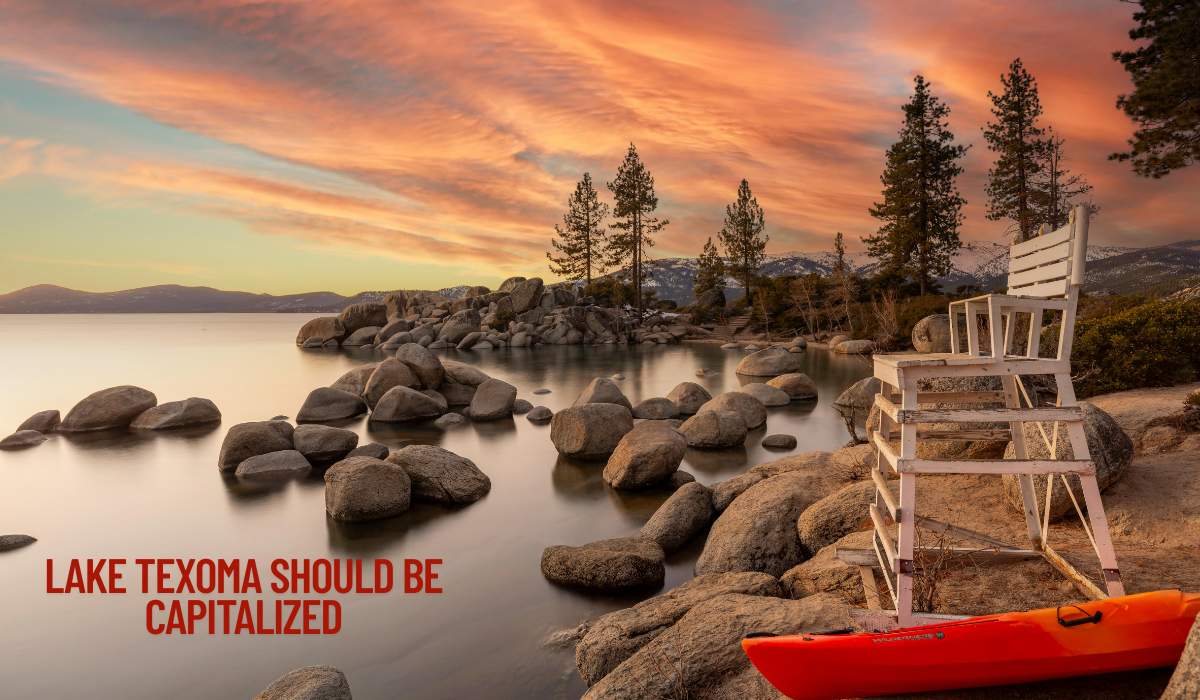When referring to prominent geographical features like “Lake Texoma,” proper capitalization is key to ensuring clarity, professionalism, and adherence to grammar rules. Whether you’re crafting an essay, drafting a formal email, or writing a blog post, understanding why and when to capitalize terms like “Lake Texoma” is essential. Below, we break down the rules, provide examples, and answer common questions to make this clear and simple.
Why Lake Texoma Should Be Capitalized?
The phrase “Lake Texoma” is a proper noun, meaning it refers to a specific and named location. Geographical features like lakes, mountains, rivers, and countries are always written in capital letters as they represent unique identifiers. Here’s why capitalization is required for “Lake Texoma”:
- “Lake” Is Part of the Proper Name
- Capitalization is required when “lake” is paired with a specific name, such as in “Lake Texoma.” This rule is the same for names like “Lake Michigan” or “Lake Tahoe.”
- Clarity and Formality
- Writing “lake texoma” lowers the sentence’s credibility. Proper capitalization follows standard conventions and appears professional. For example:
- Incorrect: I went fishing at lake texoma.
- Correct: I went fishing at Lake Texoma.
- Consistency Across Style Guides
- Leading writing style guides, such as the Chicago Manual of Style, AP Stylebook, and MLA Handbook, all emphasize the importance of capitalizing proper nouns, including names of geographical features. By following this rule, you’ll align your writing with widely accepted standards.
- Specific and Recognizable
- Referring to “lake texoma” or “Texoma Lake” makes it less clear you’re discussing the official man-made reservoir located on the Texas-Oklahoma border. Capitalizing “Lake Texoma” ensures readers understand you’re referencing a well-known and specific location.
When Should “Lake” Be Lowercased?
While “Lake” is capitalized when part of a proper noun, there are instances when “lake” is lowercase. Here’s when to apply lowercase formatting:
- Generic Use
If “lake” is used generically, not as part of a proper name, it’s written in lowercase. For example:
- Correct: We swam in the lake near our cabin.
- Incorrect: We swam in The lake near our cabin.
- Preceded by an Article
Use lowercase when “lake” is preceded by “the” and the proper noun is not involved:
- Correct: The lake near the campground is stunning.
- Incorrect: The Lake near the campground is stunning.
Table 1. Common Errors and Corrections
| Mistake | Why It’s Incorrect | Correct Version |
|---|---|---|
| lake texoma | Improper formatting | Lake Texoma |
| Lake texoma | Missed capital on “Texoma” | Lake Texoma |
| Texoma Lake | Not the official order | Lake Texoma |
| the Lake Texoma | “Lake” should be lowercase here | the lake Texoma |
FAQs About Capitalizing Place Names
Q1. Is “Lake Texoma” a proper noun?
Yes, it is. “Lake Texoma” is a proper noun because it refers to a specific and unique place. Geographical names like “Pacific Ocean” or “Rocky Mountains” follow the same capitalization rule.
Q2. What happens if I write “lake texoma” instead?
Writing “lake texoma” appears unprofessional and incorrect. It lacks clarity and may confuse readers who are unfamiliar with grammar rules.
Q3. What are the official guidelines for capitalization?
Style guides like the Chicago Manual of Style, MLA Handbook, and AP Stylebook all require proper nouns, including names of places, to be capitalized.
Q4. Is “Texoma Lake” acceptable?
No, “Texoma Lake” is not correct because it is not the official order of the name. The official and widely recognized name is “Lake Texoma.”
Q5. Do I capitalize “lake” when it’s not part of a name?
No, “lake” is written in lowercase when used in a general sense or when preceded by an article like “the.” For example:
- Correct: The lake near our cabin is beautiful.
- Incorrect: The Lake near our cabin is beautiful.
Q6. Are other geographic features, like rivers and mountains, capitalized the same way as lakes?
Absolutely! For example:
- River Nile, not “river nile.”
- Mount Everest, not “mount everest.”
Q7. Why does proper capitalization matter?
Proper capitalization ensures clear communication, maintains professionalism, and aligns with widely accepted writing standards.
Mistakes to Avoid
- Writing in All Lowercase
- Avoid writing “lake texoma.” It appears careless and informal.
- Capitalizing Only One Word
- Don’t forget to capitalize “Texoma” along with “Lake” (e.g., “Lake texoma”).
- Changing the Word Order
- “Texoma Lake” is not correct because it alters the formal name. The recognized name is “Lake Texoma.”
- Unnecessary Articles
- When referring to the entity as a proper noun, avoid saying “the Lake Texoma.” Articles like “the” diminish the name’s formality.
Final Thoughts on Capitalization
Understanding and correctly applying capitalization rules for “Lake Texoma” is more than just a grammar exercise; it’s a way to ensure clarity and professionalism in your writing. By following proper guidelines, your communication will look polished and educated, whether you’re working on formal documents or casual correspondence.

